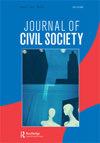Producing leadership legitimacy in civil society – A study of online presentations of leaders in Sweden
IF 0.9
Q3 POLITICAL SCIENCE
引用次数: 0
Abstract
ABSTRACT This article investigates how Swedish civil society organizations (CSOs) legitimize their leaders through online press releases presenting newly elected or recruited leaders, and which leadership ideals that are reproduced. The aim is to analyze how leaders are socially legitimized through leadership ideals in a time of increased demands on CSOs. The study moves away from the dominant perspective on leaders as actors contributing to the organizations, in favour of studying leaders as organizational assets whose image needs to be handled by the organizations. The article is based on a qualitative analysis of 54 online statements from Swedish peak CSOs, focusing on how the leaders are presented concerning personal characteristics, qualifications and missions. The results of the study indicate that Swedish CSO leaders are mainly legitimized with reference to traditional popular movement leadership ideals. Such ideals seem to serve as legitimators regardless of the type of organization. However, there are also legitimacy claims linked to managerial and administrative skills in line with third sector leadership ideals, suggesting potentially conflicting expectations on CSO leaders. These findings can be related to trends such as New Public Management, which push civil society actors to develop new skills and networks and to become more business-like.在民间社会中产生领导合法性——瑞典领导人在线演讲研究
本文研究了瑞典公民社会组织(cso)如何通过在线新闻稿使其领导人合法化,这些新闻稿展示了新当选或招募的领导人,以及哪些领导理想被复制。其目的是分析领导者如何通过领导理想在公民社会组织的需求增加的时候被社会合法化。该研究摆脱了将领导者视为对组织做出贡献的行动者的主导观点,转而将领导者视为组织资产,其形象需要由组织处理。本文基于对54份瑞典顶级cso网络声明的定性分析,重点关注领导者在个人特征、资格和使命方面的表现。研究结果表明,瑞典公民社会组织领导人主要是参考传统的大众运动领导理想合法化。无论组织类型如何,这些理想似乎都是合法的。然而,也有合法性主张与符合第三部门领导理想的管理和行政技能有关,这表明对CSO领导人的期望可能存在冲突。这些发现可能与新公共管理等趋势有关,这些趋势推动民间社会行动者发展新的技能和网络,并变得更加商业化。
本文章由计算机程序翻译,如有差异,请以英文原文为准。
求助全文
约1分钟内获得全文
求助全文

 求助内容:
求助内容: 应助结果提醒方式:
应助结果提醒方式:


